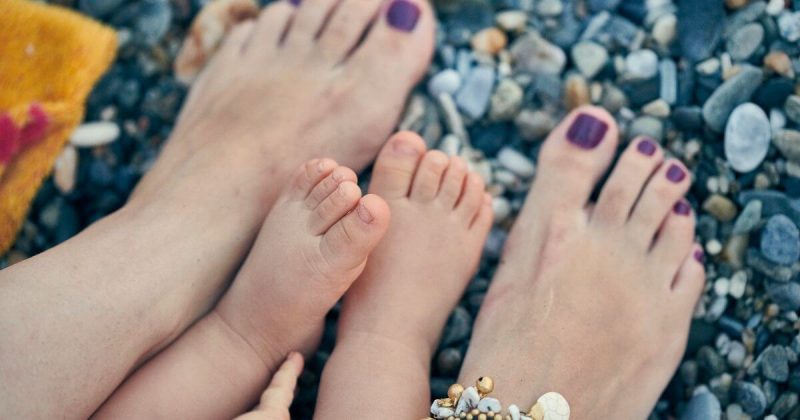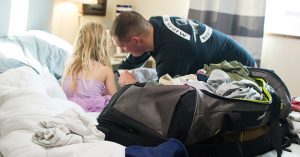When I learned that my baby’s due date would fall during my husband’s deployment, I knew that the birth would be challenging. We spent months deciding where I should give birth and how to get the most support from family and friends while he was away. After contacting a doula and a friend to be there with me in the hospital and inviting my mom to stay with our other young children, I felt as prepared as one can possibly be for a deployment baby.
But one thing we didn’t plan for was a natural disaster. One week before my due date, we learned that there was a Category 3 Hurricane heading straight for our coastal North Carolina town. Although evacuations were optional, many local families either evacuated inland or prepared to spend the days home with their service member, sheltering in place. For me, as a pregnant mom with a deployed spouse, neither of those options were possible. I couldn’t evacuate, because driving inland around my due date could mean me going into labor while stuck in hours of traffic. But staying put with young children in a home that might lose power for several days seemed equally dangerous.
Luckily, with support from my family, I was able to find the help and resources that we needed to get through this very high-stress time. I am not the only military spouse who has been in this situation. Natural disasters like hurricanes, tornadoes, earthquakes and forest fires can strike any time, including during deployments. Even when the service member is home, the military base may call them up for emergency response teams, which means they are unable to stay with their families. Every year, many military families are faced with the difficult choice to evacuate themselves or to shelter in place without their service member spouse.
I ended up giving birth to my son in the base hospital just as Hurricane Irene hit North Carolina. It was a terrifying experience, especially since my service member was overseas. But my consolation was in our preparations. I was confident that my other children would be okay, since I had left them with my mom, a generator and lots of additional food and supplies. I was able to communicate with my husband through the American Red Cross. I wasn’t alone in the hospital because I had previously arranged for a doula through Operation Special Delivery. And because I had let the unit Family Readiness group know about my situation, I was pleasantly surprised to receive a teddy bear and small flower bouquet in the hospital recovery room. If you find yourself in that difficult situation, know that you aren’t alone! Here are some steps to get you through a challenging natural disaster.
- Make an emergency plan. Some natural disasters, like hurricanes, give you several days of advanced notice so you can prepare. Others, such as earthquakes and forest fires, happen without warning. When you move to a new area, take the time to learn about natural disasters that can happen in your area and how locals prepare for them. Discuss various options with your spouse, so that you can agree on how to react and what to do with your children and pets during different types of disaster scenarios. You should also stock up on basic emergency supplies, like bottled water, flashlights and food (MRE’s work well for this) so that you won’t have to rush to the store when a disaster is announced. Use FEMA.gov or Ready.gov to make your preparation checklists.
- Know your evacuation options. Often, military families are stationed far from their families and support systems. An evacuation may mean driving to an unknown town to shelter in a hotel. The other option is to join locals at a public place like a school gymnasium. Military bases often provide temporary emergency shelters with generated electricity, but you should expect to pack your own bedding and food for these locations, and some may not allow pets. Listen to local news and officials about where to go and when to evacuate, and follow the evacuation preparations in this article. In my case, all pregnant women past 38 weeks were encouraged to shelter at the base hospital, in case they went into labor. Although the hospital and base were officially closed, the medical personnel on the delivery floor sheltered at the hospital to assist the handful of women who gave birth during the storm. My children were not allowed to join me at the hospital, so I had to prepare my house and arrange for my mom to take care of them while I went to deliver my baby.
- Know your local resources. There are numerous resources available to military families, before and after natural disasters. You can use the American Red Cross to convey an emergency message to your service member. My doctor helped me do this once I was admitted for delivery, so my Marine could go to the Communication tent and get in touch with me during delivery. Military OneSource provides free non-medical counseling which you can use before or after an emergency to work out your options, pursue different resources and find the support you need. Talking to someone else can help relieve your stress and help you think more clearly during an emergency. Finally, stay in touch with your military unit or base to learn about specific support organizations in your area, or research the organizations listed here.
- Save money for emergencies. You never know how much you will need for a natural disaster, but you should always keep an emergency fund in a savings account. You may need this for gas, plane tickets, or to pay for a hotel. If you suffer from spoiled food or a mandatory evacuation, insurance may help reimburse the costs, but it can take a while to receive the check. Because I was concerned about my mom being stuck at my house with two toddlers and no electricity for several days, we decided it was important to invest in a generator and fuel. Although it was a big purchase, it was worth it because it gave us both peace of mind when preparing for the storm.
- Get support. Call in your local support squad and let them know if you need extra help handling a disaster with your spouse away. Perhaps you can team up with other parents to share childcare and storm prep work. Or you can have a friend pick up emergency supplies at the store for you. Make sure you are in communication with the military chain of command, even if you do not live near the base. During an emergency, the Family Readiness personnel (FRG, FRO, or Ombudsman) may try to reach out and contact families to see who needs additional support. Talk to your service member about getting onto the email list or phone contact list for the unit, so you won’t be left out.
Giving birth during a natural disaster was a stressful experience I would not wish on anyone. By using your resources and planning ahead, you can reduce your stress and handle the experience, even without your service member.





